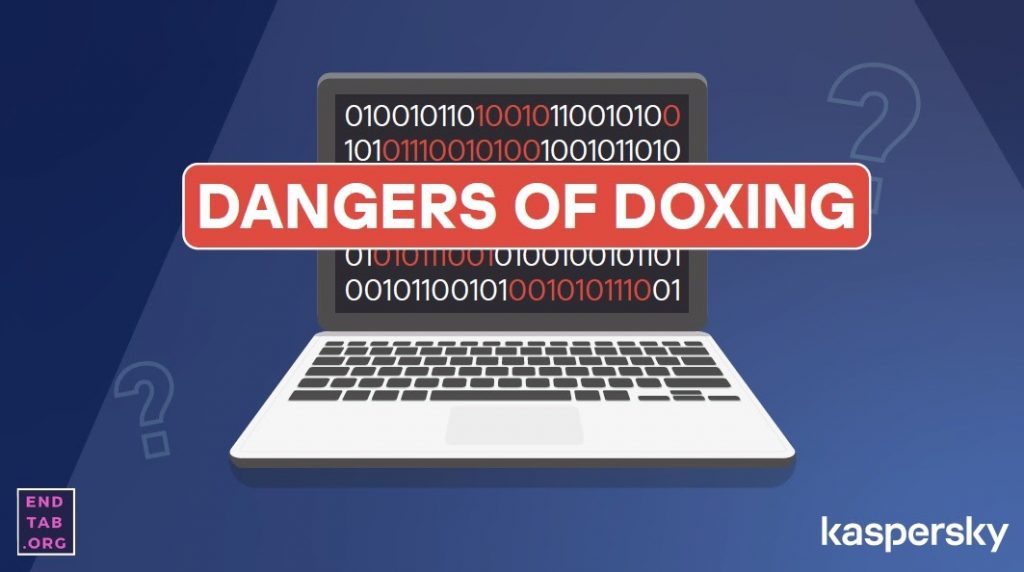With our lives essentially transferred to the digital world since last year, keeping our digital space safe and secure has become more important than ever. Recognizing the importance of online privacy led to the growth of privacy-focused products, yet many people remain confused about what dangers the exposure of personal data may lead to.

Knowing the threats that are out there makes it easier to take measures to avoid them, and one such threat is doxing – the act of gathering and revealing identifying information about someone online against their will. To help users protect themselves and their close ones against doxing, Kaspersky, together with Endtab.org, has launched a free online course. It shines a light on what doxing is, what to do to protect against it, and how to deal with its consequences.
It is often thought that doxing is something that happens to vulnerable groups or people of specific professions, such as journalists, activists, or sex workers. Many people assume that their lives are not interesting enough for them to become victims of targeted online attacks. Yet, practice shows that this is not the case and people from all backgrounds can become victims of doxing.
There are numerous reasons behind doxers’ actions – including having fun online and not appreciating the harm they inflict, exacting justice (often mistakenly), revenge, jealousy, harassment and even profit.
Doxing is something that can happen once and disrupt a person’s life entirely, without them ever foreseeing it. Users are exposed online in numerous ways that are not limited to just social media presence. Exposure can also come from data leaks, fitness trackers sharing information to the public, official records, and private messages.
We leave a vast trace of our personal data, and this data can be picked up and used to doxers’ advantage. With that in mind, taking back control of users’ data and “owning their digital lives” becomes essential in ensuring people’s wellbeing. To achieve this, users need to develop positive digital habits and approach online activity mindfully. The course developed by Kaspersky and EndTab.org is aimed at helping with that.
Split into seven short lessons, the course lays out the basics for understanding the origins of doxing, the goals doxers pursue, ethical aspects of this practice, how to defend against it, and, most importantly, what to do if you or someone you know has been doxed. The first half of the course is already available online with the remaining lessons to be released in the following weeks.
“It’s no news that we live in a digital world, and just as in the real world, we need to develop good habits and follow rules that will help us navigate the space safely. We are bringing our expertise in cybersecurity and technology usage to provide users with the right knowledge and tools to help in this aim,” comments Anna Larkina, Kaspersky’s privacy expert.
“Of course, doxing is not something that happens to people massively, however, we are never 100% secure from it. And sadly, our actions cannot guarantee that someone angry on the internet or in real life will not pick us as a victim – regardless of whether the ultimate goal is cyberbullying, extortion, maybe for fun, or even bringing what the doxer might see as a sense of justice. So, the best way to avoid trouble is to know what you are dealing with and I hope that our course will help users feel more empowered, while experiencing less digital stress, so they can enjoy technology worry-free,” adds Larkina.
“It is also important to know how to not become a doxer yourself – by accident or on purpose. We need to understand why this practice is a dangerous one, and something that goes against ethical standards that we as society strive to follow,” comments Anna Larkina, Kaspersky’s privacy expert,” says Larkina.
“While doxing may not be on everyone’s radar, it should be. This is particularly true for parents. While anyone can be a target, this is a form of harm that shows up in cyberbullying and teen dating abuse situations. By being informed about the dangers of doxing, we can help keep ourselves and our children safer online,” adds Adam Dodge, CEO of Endtab.org
The online course is the first part of a series of tools that the Kaspersky team will release in an effort to enable users to sustain and enhance their digital wellbeing. The course is available on education.kaspersky.com for free.
Read the Dox, steal, reveal. Where does your personal data end up? report to learn more about doxing and personal data sold on the darknet.
About Kaspersky
Kaspersky is a global cybersecurity and digital privacy company founded in 1997. Kaspersky’s deep threat intelligence and security expertise is constantly transforming into innovative security solutions and services to protect businesses, critical infrastructure, governments and consumers around the globe. The company’s comprehensive security portfolio includes leading endpoint protection and a number of specialized security solutions and services to fight sophisticated and evolving digital threats. Over 400 million users are protected by Kaspersky technologies and we help 240,000 corporate clients protect what matters most to them. Learn more at www.kaspersky.com.
About EndTab.org
EndTAB believes you don’t have to be a tech expert to be digitally safe. Through our practical training curriculums, we empower our clients to prevent and address the ways technology and the Internet are commonly misused to harm their staff, clients and communities. We work with Universities, Governments, Nonprofits, the Military and For-Profit organizations to promote digital safety around the world.
